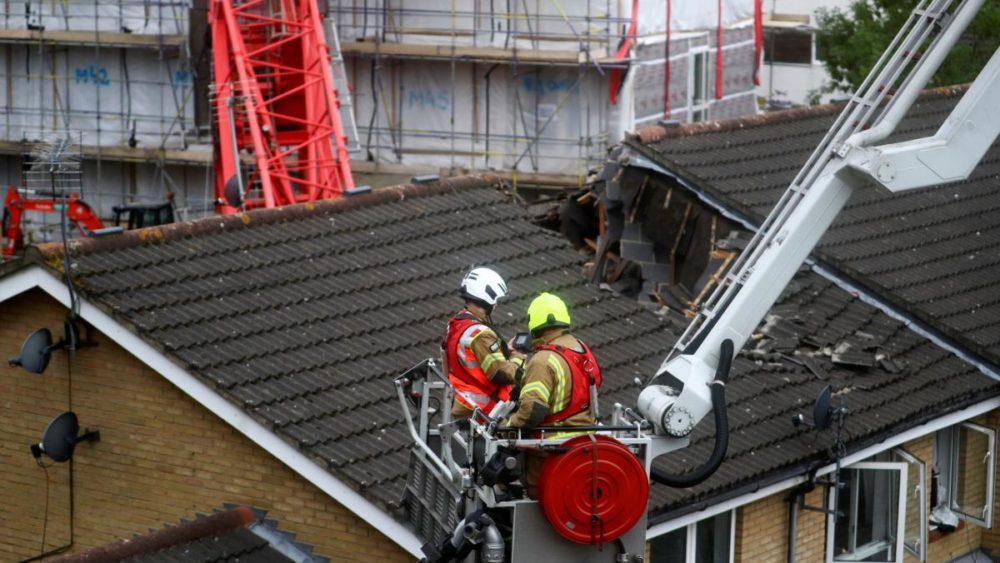“The sight of an enormous crane crushing ex-council properties and their residents is a potent emblem of the betrayal of working class communities in London, and the relentless greed inherent in property developers in the capital.”
Britain is currently facing its worst housing crisis in living memory, and with virtually no new social housing being built, those reliant on private accommodation are facing an insecure future without the right kind of government intervention. In response to COVID-19 Boris Johnson’s hard-right Brexiteers have been forced to implement stimulus packages totalling billions of pounds, in stark contrast to the previous decade of austerity. The “magic money tree” has well and truly been found, and housing policy has become a central issue in recent months, with a planning regulations bonfire looming on the agenda this summer, alongside Robert Jenrick’s ongoing Printworks scandal embodying the inherent corruption of British neoliberal politics.
With the government shouting “build, build, build” to try and kick the issue of Britain’s housing crisis into the long grass, and with targets dating as far back as 2015 as yet unfulfilled, it’s difficult not to be sceptical about the current government’s ability to deliver on these targets. Issues of poor quality, small and unaffordable properties for sale were highlighted by a government review, as well as a report by the Greater London Authority which found just 0.4% of new builds between 2013 and 2019 were deemed “affordable”, a problematic term meaning rents set at 80% of market value (hardly affordable to many in the capital). With the major economic impact of the pandemic likely to be felt when the furlough scheme draws to a close later in the year, we will see many more people in the UK abandon their ambitions of home ownership.
Whilst the experience of the lockdown was unevenly felt — from frontline workers, through those on furlough and those made redundant — the fact that most of the country was housebound for months highlighted the disparity in housing quality between the haves and have-nots. Earlier this year private rents skyrocketed to an all-time average high of £700 per month in England, and £1,425 in London. The experience of many such as myself, spending months cramped in a one-bedroom flat with no outside space could prove unbearable at times, especially for those living alone. The misery of many tenants living in rented accommodation has been exacerbated by inflexible and cruel landlords unwilling to make exceptions for long-term tenants who might be experiencing financial difficulties.
A ban on evictions has been extended until 20th September, along with a mortgage holiday for many, and a ban on home repossessions until 31st October. However, these measures are all timed to expire within weeks of each other, with many warning of a new “homelessness crisis” to be unleashed just before winter. In truth, the “previous” homelessness crisis never actually ended, but was merely put on hiatus as the government rushed rough sleepers off the streets, but soon kicked them back out as soon as the lockdown was eased.
The precarious nature of private rented accommodation was brought to bear for me in the tragic crane collapse that took place in Bow on 8th July, causing the death of June Harvey, a long-time resident.
The shoddy installation of a 65ft crane on a construction site for a block of medium rise apartments is still under investigation by the police, leaving the family of Mrs Harvey without answers for the time being. The sight of an enormous crane crushing ex-council properties and their residents is a potent emblem of the betrayal of working class communities in London, and the relentless greed inherent in property developers in the capital.
Close to 100 have been evacuated from the surrounding flats and terraced houses, myself included, with some residents being told they will not be able to return for at least six months, others closer to a year. Tower Hamlets Council have provided emergency funding to residents to pay for food and clothing, as well as a freeze/refund for Council Tax, but temporary accommodation costs will have to be met by loss adjusters and insurance companies, meaning that residents have to pay costs up front and wait weeks for reimbursement. My own lettings agent had the audacity to ask for my rent to be paid in full with the possibility of a discount being applied in the future. Despite flying in the face of all common sense and logic, my contract has a clause stating that tenants won’t have to pay for the property when it isn’t fit for habitation, so I’ve been able to withhold rent payments for the time being.
Up and down the country, tenants are going through financial difficulties, either directly due to COVID-19 redundancies, or a radical loss of income for the self-employed or those on furlough.
For some, the lockdown has empowered a new kind of tenant action, like those in university accommodation, organised by Rent Strike, who have effectively used Zoom, online forms and social media to garner wide support for their demands. Renter’s Unions in London, Scotland and across the UK are able to defend their members through fundraising, eviction resistance and rent negotiation.
Tenant actions can lead to some inspiring success stories, such as earlier this month when hundreds of tenants in Newham secured massive rent reductions — in some cases up to 60% — through collective action against their negligent landlords, and after four years of campaigning forced Newham council to take ownership of the properties. To secure genuinely affordable housing it is clear that more must be done by the government to end our housing crisis. There are a number of levers that can be pulled, from rapidly scaling the construction of social housing, through to the introduction of a universal basic income, as DiEM25’s Universal Basic Dividend (UBD) proposal has been calling for.
Housing has to be enshrined as a human right, rather than treated as a commodity or an investment. In the short term, rent controls would weaken the profit mechanism that motivates developers to build shoddy housing and rent it out at extortionate prices, and we have seen this policy work well in Berlin. Ultimately, DiEM25’s Green New Deal for Europe offers the blueprint for ensuring quality housing that will be affordable for all, granting dignity and a sustainable future for all of us and entrenching equality. To do so, we need to take action at every level of society, and we need to do it today.
What can you do if you’re unable to pay your rent?
- Financial advice from Shelter (UK)
- Join your local renter’s union – for example Acorn have coverage across the UK and Londoners should join the London Renter’s Union
- Read ‘Can’t Pay, Won’t Pay’ by Rent Strike
- Read the ‘Tenant Power Toolkit’ developed by KC Tenants and the Progressive International
Photo from Reuters.
Do you want to be informed of DiEM25's actions? Sign up here















